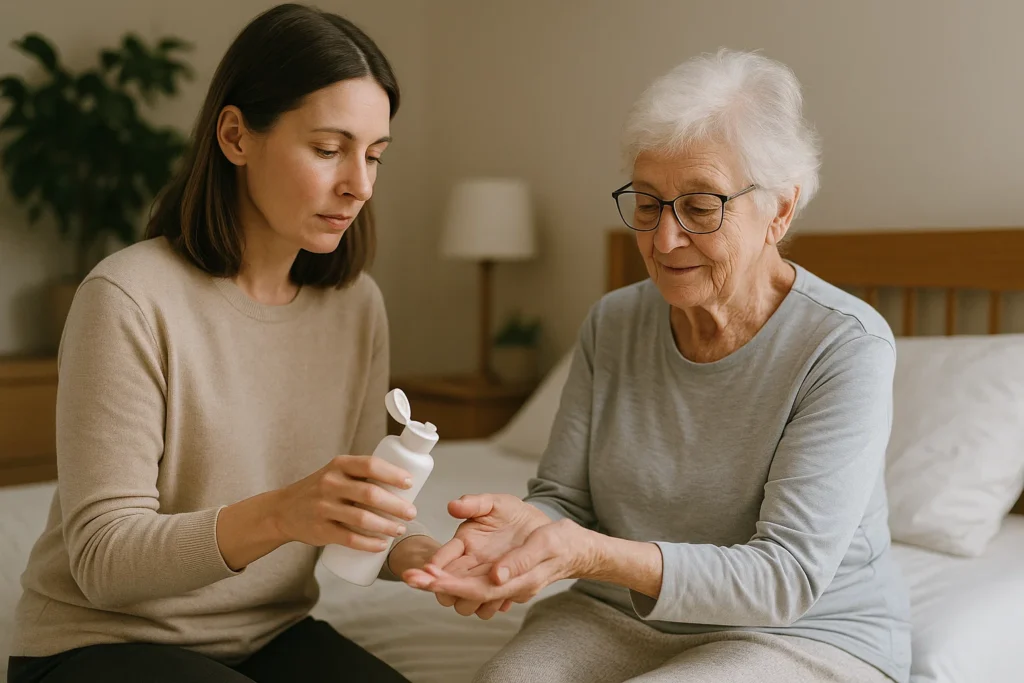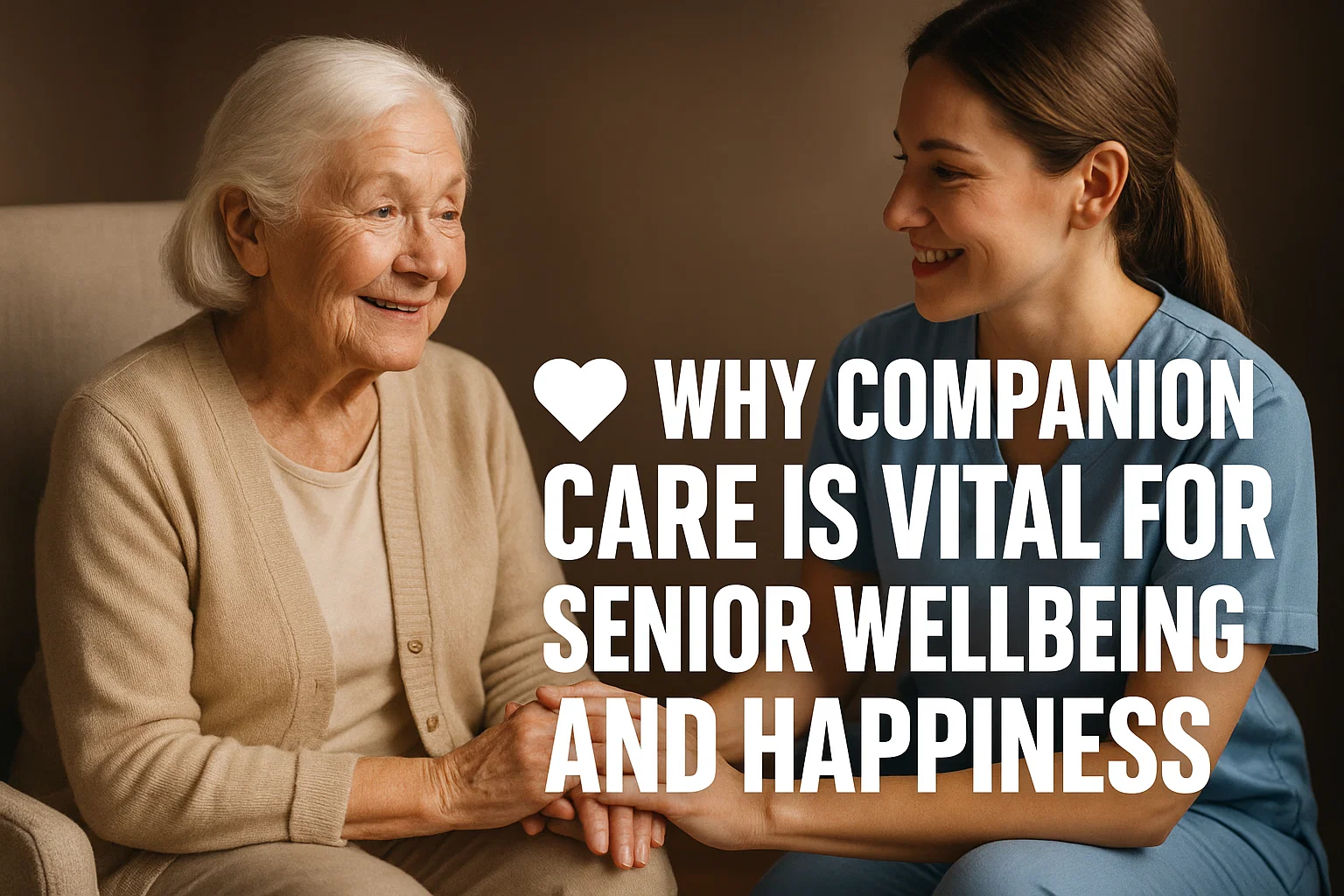When we think about caring for our aging parents or grandparents, most of us focus on physical needs — making sure they’re fed, safe, and taking their medications. But in over two decades of working closely with seniors and their families, I’ve learned that emotional wellbeing matters just as much — if not more.
What many don’t realize until it’s too late is how deep loneliness and isolation can affect an elderly person’s health. That’s where companion care comes in — a simple, loving way to bring connection and joy back into a senior’s life.
What Is Companion Care for the Elderly?
Understanding the Role of a Companion Caregiver
Companion care isn’t about medical tasks — it’s about showing up, being present, and connecting. A companion caregiver is someone who spends time with your loved one — having conversations, playing games, helping with light tasks, or just being there during meals or walks.
They’re the friendly face that breaks up long, lonely hours. They’re someone who listens without rushing. And often, they become a trusted part of the family.
Key Differences Between Companion Care and Other Senior Services
Unlike personal care — which includes help with bathing, dressing, or toileting — or skilled nursing care — which deals with medical needs like injections or wound treatment — companion care is purely social and supportive.
Think of it as having a thoughtful friend who helps with:
- Light errands and chores
- Meal prep and shared meals
- Going out for walks or rides
- Watching TV or reading together
- Simply talking, laughing, and listening
Emotional Benefits of Companionship for Seniors

Combating Loneliness and Isolation
Here’s the truth — I’ve walked into homes where the only sound for days was the hum of the refrigerator. Seniors who live alone often go days without speaking to anyone. Over time, that silence takes a toll.
Companion care brings life back into the home. A conversation over a cup of tea, a short walk in the garden, a few laughs — these things don’t just brighten someone’s day. They improve heart health, reduce anxiety, and even lower the risk of cognitive decline.
How Companionship Supports Mental Health and Mood
It’s not just about having someone around. It’s about being seen, heard, and valued. When seniors feel forgotten, they shut down. But when they have someone to share their stories with — someone who asks questions, remembers their preferences, and shows interest — their whole demeanor changes.
We’ve seen it again and again: an elder who once sat quietly all day suddenly begins talking more, eating better, and even sleeping better. It’s incredible what connection can do.
How Companion Care Prevents Senior Loneliness
Social Connection and Daily Interaction
Even if a caregiver only visits a few times a week, that regular connection becomes a lifeline. It creates structure and gives seniors something to look forward to.
Just knowing someone is coming — someone they trust and enjoy — can lift their spirits. They eat better. They get dressed. They get up and move. All because they don’t feel invisible anymore.
Building Meaningful Relationships Through Routine Activities
The beauty of companion care is that the relationship builds naturally over time. It’s not forced. It’s in the small things: folding laundry together, baking a simple recipe, or sitting side-by-side watching old movies.
Those routines become rituals — and those rituals become healing.
Activities to Do with Elderly Loved Ones
Simple, Joyful Activities for Cognitive Engagement
You don’t need to reinvent the wheel. Some of the most meaningful activities are beautifully simple:
- Looking through photo albums
- Playing a card game
- Watering plants
- Listening to their favorite music
- Writing a letter together to a grandchild
These moments are grounding. They awaken memory, bring smiles, and keep the brain gently active.
Physical and Outdoor Activities That Encourage Mobility
Movement is medicine. It doesn’t have to be intense. A short walk down the driveway, some stretching, or even helping fold laundry gets the body moving. And when a companion encourages it — not forces it — it feels natural, not like a chore.
I’ve watched seniors go from barely moving to eagerly walking around the block just because they had someone walking with them.
Signs Your Parent Needs Personal Care Assistance
Physical and Emotional Warning Signs to Watch For
Sometimes, companionship alone isn’t enough — and that’s okay. The key is noticing the signs early. Look for:
- Neglected hygiene
- Unwashed dishes piling up
- Missed medications
- Confusion or forgetfulness
- Sudden mood changes or withdrawal
These aren’t just “aging.” They’re signals. And ignoring them can lead to real danger — falls, malnutrition, or depression.
When to Transition from Companion to Personal Care
When your loved one starts needing help with daily tasks like bathing, dressing, or using the bathroom, that’s when you know it’s time to consider personal care.
At Precious Pearls, we don’t rush that transition. We help families make that shift with sensitivity, making sure the care feels like a natural extension of what they’re already receiving.
Differences Between Personal Care and Nursing Care

Scope of Services and Qualifications
Let’s break it down simply:
- Companion Care = Social support (talking, errands, activities)
- Personal Care = Help with personal hygiene and mobility
- Nursing Care = Medical tasks (wound care, injections, vitals)
Each has its place — and sometimes they work together. A senior may start with a companion and eventually receive visits from a nurse for wound checks while still enjoying regular companionship.
Choosing the Right Type of Care for Your Loved One
Don’t choose based on fear. Choose based on what your loved one needs now — and know that your choice can evolve.
The right care feels respectful, warm, and empowering. If your loved one smiles more, eats better, and begins to talk again — you’ll know you made the right call.
Final Thoughts
You don’t need to wait for a crisis to bring in support. Companion care is a gentle, beautiful starting point — and it often prevents the need for more serious interventions later.
At Precious Pearls Home Health Care, we’ve walked beside hundreds of families in North Bellmore and surrounding areas as they figured out how to care for aging loved ones with dignity. If you’re not sure where to start, start with a conversation.
Because sometimes, all it takes is one visit — one voice — to remind your loved one they’re still deeply loved.
FAQs
Companion care focuses on emotional support and social interaction, not medical tasks. Unlike nursing care — which involves medications or wound care — companion caregivers provide company, help with light chores, and offer meaningful engagement like conversation, walks, or games. It’s about presence, not procedures.
Not at all. While many seniors who live alone benefit greatly, even those living with family can need companion care — especially if loved ones are working or not always available. Having a trusted, consistent visitor ensures the senior gets focused attention, interaction, and routine throughout the week.
There’s no one-size-fits-all answer. Some families schedule a few visits per week, while others prefer daily check-ins. At Precious Pearls, we customize care plans based on your loved one’s personality, social needs, and lifestyle — whether it’s occasional companionship or regular support.






